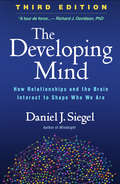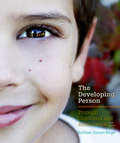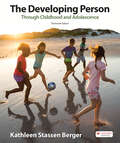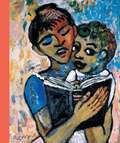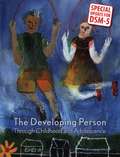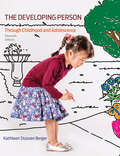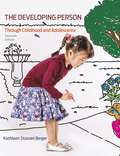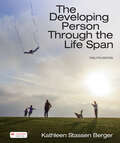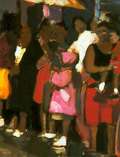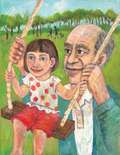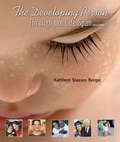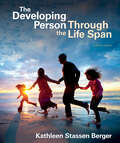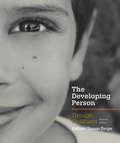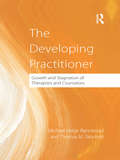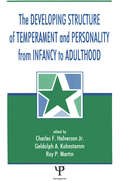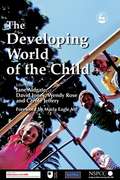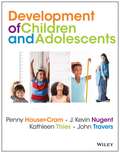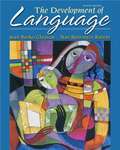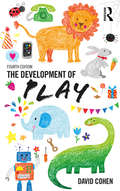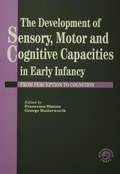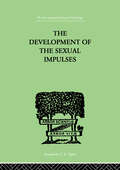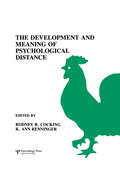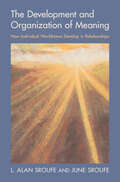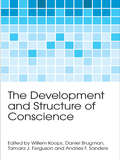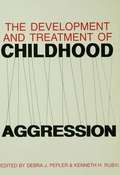- Table View
- List View
The Developing Mind, Third Edition: How Relationships and the Brain Interact to Shape Who We Are
by Daniel J. SiegelThis highly influential work--now in a revised and expanded third edition incorporating major advances in the field--gives clinicians, educators, and students a new understanding of what the mind is, how it grows, and how to promote healthy development and resilience. Daniel J. Siegel synthesizes cutting-edge research from multiple disciplines, revealing the ways in which neural processes are fundamentally shaped by interpersonal relationships throughout life. And even when early experiences are not optimal, building deeper connections to other people and to one's own internal experience remains a powerful resource for growth. Professors praise the book&’s utility in courses from developmental psychology and child development to neuroscience and counseling. New to This Edition *Incorporates findings from a huge body of recent research; over 1,000 citations added. *Revisits and refines the core hypotheses of interpersonal neurobiology. *Chapter on the experience of belonging and the development of identity. *New or expanded discussions of behavioral epigenetics, the default mode network of the brain, social neuroscience, cultural and gender issues, theory of mind, the Wheel of Awareness contemplative practice, the science of consciousness, and more.
The Developing Person
by Kathleen Stassen BergerExceptional in its currency, global in its cultural reach, Kathleen Berger's portrait of the scientific investigation of childhood and adolescent development helps bring an evolving field into the evolving classroom. Guided by Berger's clear, inviting authorial voice, and page after page of fascinating examples from cultures around the world, students see how classic and current research, and the lives of real people, shape the field's core theories and concepts. In addition to Kathleen Berger's exhaustive updating of the research, this edition is notable for its thorough integration of assessment throughout (learning objectives, assessments after each section, expanded end-of-chapter quizzes) all aligned with national standards. The new edition is also more than ever an integrated text/media package, moving students from the printed page to online tools that help them develop observation and critical thinking skills. Those online components are all a part of the book's dedicated version of LaunchPad, Worth Publishers' breakthrough online course space in which power and simplicity go hand in hand. To order LaunchPad for free with this text please use bundle isbn 978-1-319-01699-9.
The Developing Person Through Childhood & Adolescence
by Kathleen BergerKathleen Berger’s critically praised bestseller connects developmental psychology theory, research, and applications to the lives students actually live.
The Developing Person Through Childhood & Adolescence
by Kathleen Stassen BergerEdition after edition, Kathleen Stassen Berger's The Developing Person Through Childhood and Adolescence re-emerges as the ideal textbook for the chronologically-organized development course--a perennial bestseller that always provides an authoritative portrait of the field, carefully crafted learning tools, and a narrative style and emphasis on cultural contexts that make the material relevant to its broad student audience.
The Developing Person Through Childhood & Adolescence 9th Edition
by Kathleen Stassen BergerThis book is a chronologically organized textbook on child development with a broad cultural perspective and DSM 5 Updates.
The Developing Person Through Childhood and Adolescence
by Kathleen Stassen BergerFor every chapter, the "Study Guide" will include a "Preview" and "At A Glance" sections (both provide an overview of and objectives for the chapter). Each major topic includes a progress test, comprised of multiple-choice, matching, and/or true/false questions. The Guide also contains "Graphic Organizers," which encourage students to complete graphs, charts, and flow diagrams that ultimately provide a visual synopsis of text material. End-of-chapter material includes "Something To Think About" sections, which contain thought provoking questions designed to encourage critical thinking and application of the material.
The Developing Person Through Childhood and Adolescence (11th Edition)
by Kathleen Stassen Berger<p>Exceptional in its currency, global in its cultural reach, Kathleen Berger’s portrait of the scientific investigation of childhood and adolescent development helps bring an evolving field into the evolving classroom. Guided by Berger’s clear, inviting authorial voice, and page after page of fascinating examples from cultures around the world, students see how classic and current research, and the lives of real people, shape the field’s core theories and concepts. <p>In addition to Kathleen Berger’s exhaustive updating of the research, this edition is notable for its thorough integration of assessment throughout (learning objectives, assessments after each section, expanded end-of-chapter quizzes) all aligned with national standards.</p>
The Developing Person Through the Life Span
by Kathleen BergerKathleen Berger’s critically praised bestseller connects developmental psychology theory, research, and applications to the lives students actually live.
The Developing Person Through the Life Span
by Kathleen Stassen BergerThis book discusses in detail the person through their life span from birth through to their death.
The Developing Person Through the Life Span
by Kathleen Stassen BergerThis book is an authoritative, established text that engages students in the study of lifespan development from a chronological viewpoint.
The Developing Person Through the Life Span
by Kathleen Stassen BergerEdition after edition Kathleen Stassen Bergers perennial bestseller, The Developing Person Through the Life Span, re- establishes itself as the most authoritative, engaging, and teachable textbook available for the life span course. The new edition is no exception. As always, Bergers narrative style and emphasis on diversity and universal themes speak directly to students. The books thoroughly updated coverage makes the latest scientific and theoretical developments about the brain, genetics, and cultural diversity accessible and meaningful. And powerful media tools such as DevelopmentPortal, the interactive eBook, and the Video Tool Kit for Human Development give students realistic observational experience to further enhance their study
The Developing Person Through the Life Span
by Kathleen Stassen BergerWith Kathleen Stassen Berger's always contemporary, always compelling textbook, students learn to see how the basic ideas of developmental psychology apply to their own lives, the lives of those around them, and the lives of others of all life stages and in cultures all around the world. Berger's narrative voice, wide-ranging cultural perspective, and focus on universal themes captivate students from the outset, helping them grasp the important theoretical and scientific work driving the field of developmental psychology today.
The Developing Person: Through Childhood, Seventh Edition
by Kathleen Stassen BergerKathleen Stassen Berger's The Developing Person Through Childhood is the ideal textbook for the chronologically-organized development course--a perennial bestseller that always provides an authoritative portrait of the field, carefully crafted learning tools, and a narrative style and emphasis on cultural contexts that make the material relevant to its broad student audience.
The Developing Practitioner: Growth and Stagnation of Therapists and Counselors
by Michael Helge Ronnestad Thomas SkovholtThis book provides a comprehensive overview of the professional development of counselors and therapists over the career lifespan. Drawing on their own extensive experience as psychotherapists, supervisors, teachers, and researchers, as well as from their own extensive study of the topic, previously published in their 1992 book The Evolving Professional Self, the authors aim to provide an update of their work that all counselors and psychotherapists will find valuable and useful. Readers are provided with empirically based conceptual knowledge that can increase their awareness of the central issues in professional development, allowing them to monitor their own development. The authors discuss the concept of development and review the research literature on practitioner development, and then provide detailed descriptions of its six phases. Aspects of each phase addressed include the developmental tasks unique to that phase; the sources of influence and the learning process which impacts therapeutic work and a sense of development; the perception of the professional role and working style; and therapists’ measures of effectiveness and satisfaction. All of this is augmented with quotes and illustrative examples from participants in the authors’ research studies. The book includes knowledge generated from research on master therapists and from the Society for Psychotherapy Research/Collaborative Research Network. The book also considers themes of professional development; struggles faced by novice practitioners; patterns of practitioner resiliency; and ways to improve training, supervision, and practice.
The Developing Structure of Temperament and Personality From Infancy To Adulthood
by Geldolph A. Kohnstamm Charles F. Halverson Roy P. MartinThis book is the first to bring together researchers in individual differences in personality and temperament to explore whether there is any unity possible between the temperament researchers of infancy and childhood and the major researchers in adult personality. Prior to the workshop which resulted in this volume, the existing literature seemed to document a growing consensus on the part of the adult personality researchers that five major personality dimensions -- the "Big Five" -- might be sufficient to account for most of the important variances in adult individual differences in personality. In contrast to this accord, the literature on child and infant individual differences seemed to offer a wide variety of opinions regarding the basic dimensions of difference in personality or temperament. The editors believed that they could encourage researchers from both the adult and child areas to consider the importance of a lifespan conceptualization of individual differences by discussing their research in terms of a continuity approach. Written by some of the most distinguished scholars from Great Britain, continental Western Europe, and Eastern Europe as well as the United States and Canada, the chapters present a cross-cultural view of both adult personality and temperament in infancy and childhood. By sharing their recent data, techniques, and theoretical speculations, the chapter authors communicate the research enthusiasm engendered by the growing consensus of the adult "Big Five" as well as the exciting prospects of an integrative program of research from infancy to adulthood that will clarify and consolidate what is now a disparate set of methods, theory, and findings across the lifespan. The editors suggest that this volume will have considerable heuristic value in stimulating researchers to conceptualize their work in developmental, lifespan approaches that will lead to a consolidation of individual differences research at every age.
The Developing World of the Child
by Janet Seden Brigid Daniel Jane Aldgate Wendy Rose Gillian Schofield Anna Gupta Hedy Cleaver David P.H. Jones David QuintonThis important text shows how child development theory applies to professionals' working practice. Considering theories of development throughout the lifespan from the early years through to adolescence, and transitions to adulthood, this resource is essential reading for a range of professionals including social workers, teachers, and health and mental health professionals. The authors build up an integrated picture of the developing world of the child, looking at genetic and biological influences alongside individual psychological, interpersonal, familial, educational and wider community domains. The final part of the book looks specifically at issues for practice, including chapters on communicating with children exercising professional judgement, and planning, interventions and outcomes in children's services.
The Development Of Children And Adolescents: An Applied Perspective
by John F. Travers Penny Hauser-Cram J. Kevin Nugent Kathleen ThiesThis book provides an integrated view of child development. Presenting the most pertinent research for each developmental stage and linking this to practical applications in the areas of Parenting, Policy, and Practice, this balanced approach emphasizes the relationship between research and theory and applications. The rich media program, including WileyPLUS with Real Development promotes active learning and allows for increased understanding and comprehension of the course content. Through the combination of text and media, students are engaged in meaningful learning that deepens and enriches their understanding of developmental concepts.
The Development Of Language (8th Edition)
by Jean Berko Gleason Nan Bernstein RatnerCombining the contributions of experts and highly-respected researchers, the eighth edition of Language Development offers a definitive exploration of language acquisition and development from infancy through adulthood. Taking a multi-disciplinary approach, it examines what we know about language development--addressing communication development in infancy, phonological development, semantic development, morphology and syntax. Broadening the scope of study, it puts language development into larger biological, social and cultural contexts, while investigating individual differences, atypical development, literacy and even language development in adults. This edition includes more on cross-linguistic language acquisition (emphasizing Spanish), new research on the nature and treatment of language disorders in children, and new perspectives on the impact of culture on language development and variation.
The Development Of Play (Concepts In Developmental Psychology Ser.)
by David CohenWhy is play so important in child development? Are children in today’s society suffering from a lack of time for free play, with the emerging dominance of screen play? Can play therapy help to uncover, rescue and rehabilitate children living in abusive environments, or even in war-torn countries? Is play also important for adult development? Play is a learning experience and a crucial component to childhood development as it allows children to emulate the behaviours of those around them and to develop their social skills. In this engaging book, David Cohen examines how children play with objects, language, each other, and their parents to reveal how play enables children to learn how to move, think independently, speak and imagine. Cohen suggests that much of our formative experiences of play informs our future selves, and explores how play can help us to become better parents. This new edition of The Development of Play offers a fascinating review of the importance of play in all our lives. It includes the latest research on the impact of digital technology, brain development, cultural differences in play and toys, and also looks at why parents sometimes choose different toys for girls and boys. The book also provides advice and guidance on how parents can play creatively and imaginatively with their children. It is essential reading for Early Years, health care and education professionals as well as undergraduate students in developmental psychology and education.
The Development Of Sensory, Motor And Cognitive Capacities In Early Infancy: From Sensation To Cognition
by Butterworth University of Sussex.Research on the development of human infants has revealed remarkable capacities in recent years. Instead of stressing the limitations of the newborn, the modern approach is now more optimistically based on an assessment of the adaptive capabilities of the infant. Innate endowment, coupled with interaction with the physical and social environment, enables a developmental transition from processes deeply rooted in early perception and action to the cognitive and language abilities typical of the toddler.; This book reviews a number of issues in early human development. It includes a reconceptualization of the role of perception at the origins of development, a reconciliation of psychophysical and ecological approaches to early face perception, and building bridges between biological and psychological aspects of development in terms of brain structure and function. Topics covered include basic exploratory processes of early visual systems in early perception and action; face perception in newborns, species typical aspects of human communication, imitation, perception of the phonetic structure of speech, origins of the pointing gesture, handedness origins and development, theoretical contributions on perception and cognition, implicit and explicit knowledge in babies; sensory-motor coordination and cognition, information processing and cognition, perception, habituation and the development of intelligence from infancy.
The Development Of The Sexual Impulses (International Library Of Psychology Ser.)
by Money-Kyrle, R EFirst Published in 1999. Routledge is an imprint of Taylor & Francis, an informa company.
The Development and Meaning of Psychological Distance
by K. Ann Renninger Rodney R. CockingOne of the paradoxes in developmental theory is the child's simultaneous intrapsychic and interpsychic development. While the child is growing in mental capacity and struggling to define self, behaviors are also being learned whose function is to integrate self into a social network, which often means that egocentric behaviors are in conflict with sociocentric ones. This theory draws upon processes that promote both individual and social growth into a unified theory of development. A construct pertinent to almost all dimensions of psychological research, psychological distance is conceptualized as either the distance between what the learner understands and what still has to be understood (intrapsychic), or ways in which others adjust information for the learner in order to be fully comprehended (interpsychic). Psychological distance appears to serve both organizing and explanatory functions across seemingly diverse sets of theoretical and research questions, such as differentiation of self in personality development; conceptual representation in cognitive development; dialogue in the development of communication skills; information processing in cognitive science; regulatory mechanisms in the growth of control processes; and concept formation in cross-over areas of cognition, learning and thinking skills. This volume is based on papers presented as part of the Invitational Conference honoring Irving E. Sigel, Distinguished Research Scientist, at Educational Testing Service. In each of the chapters different models are utilized to account for the construct of psychological distance, and as such, to suggest extensions of Sigel's seminal work in this area. Together, these contributions form the basis of a discussion of psychological distance as a developmental construct -- a construct which permits serious consideration of individual differences as a function of both the process and the product of cognition and ecology.
The Development and Organization of Meaning: How Individual Worldviews Develop in Relationships
by L. Alan Sroufe June SroufeDrawing from extensive developmental research, this book highlights the significance of meaning in shaping individual worldviews within relationships, from infancy onwards. By focusing on behavior and experience, it reshapes our understanding of pertinent psychological phenomena, tracing the emergence of self, self-regulation, causality comprehension, peer relationships, adolescent experiences, and lifelong adaptation. Using developmental psychology and compelling clinical cases, the authors emphasize the central role of 'meaning' as a unifying theme, addressing diverse topics such as resilience, intergenerational behavior patterns, trauma impacts, and existential meaning. Ideal for students and professionals in psychology, counselling, and social work, as well as researchers and clinicians in related fields, this book integrates existing theories and empirical evidence to illuminate various aspects of human development and adaptation.
The Development and Structure of Conscience
by Willem Koops Daniel Brugman Tamara J. Ferguson Andries F. SandersThis book focuses on the structure and development of conscience, a subject that has been dominant in developmental psychology since the 18th century. International experts in the field contribute to this broad overview of the relevant research on the development of moral emotions and on the Kohlbergian-originated cognitive aspects of moral development. The first section of the book focuses on the cultural conditions that create the context for the development of conscience, such as moral philosophy, religion, and media violence. Building on the theory and research on emotion, other chapters cover issues including the development of shame, self regulation and moral conduct, social cognition, and models of guilt. The book also covers moral reasoning, moral identity, moral atmosphere, moral behavior, and discusses subjects such as lying, how to measure moral development, the impact of parenting, the dysfunctions of conscience evident in narcissism, psychopathy, issues surrounding gender, and aggression. The Development and Structure of Conscience will be ideal reading for researchers and students of developmental and educational psychology.
The Development and Treatment of Childhood Aggression
by Kenneth H. Rubin Debra J. PeplerComprised of papers and commentaries from the Earlscourt Symposium on Childhood Aggression held in Toronto, Canada, this volume reflects the Earlscourt Child and Family Centre's commitment to linking clinical practice to identifiable research-based interventions which are known to be effective in the prevention and treatment of antisocial behavior in children. The education of human services professionals has typically failed to train individuals to work with specific client populations, providing a generalist approach grounded in theoretical assumptions and professional values rather than research and empirical studies. This compelling book serves to fill this gap in professional education in the area of childhood aggression. Representing substantial accomplishments in the advancement of an understanding of the plight of aggressive children and how best to ameliorate their often unpredictable and painful situations, this text allows for cautious optimism that empirical research can have practical consequences for aggressive children and their prospects for a better life. As such, it is a truly important information resource for professionals in the fields of developmental psychology and counseling.
